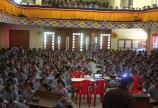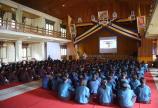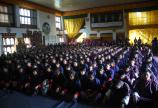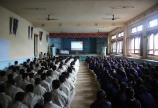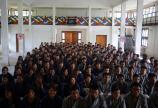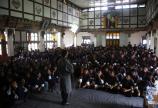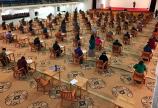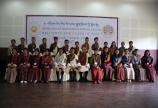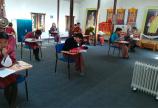The Bhutanese Connection
A unique partnership between UVic and Bhutan’s first law school forged out of a newspaper article and a UVic professor’s vision for transnational scholarly exchange

[April 26, 2018; an abridged version of this article was featured as a UVic News piece]
Just as they were about to enter their second month of classes at Bhutan's first law school this past September, the inaugural cohort of twenty-five students found themselves minus one of their senior lecturers. Rather than preparing lesson plans, Nima Dorji was hastily packing up his life and family to pursue his own PhD studies at the UVic Faculty of Law.
It was an October 2016 article in the New York Times that that ultimately led to Dorji’s change of plans and the beginnings of a unique partnership between UVic and his home institution, the Jigme Singye Wangchuck School of Law (JSW Law), in his native Bhutan. The article, detailing the establishment of the school in the tiny Buddhist Kingdom, caught the imagination of Victor V. Ramraj, professor of law at UVic and director and chair in Asia-Pacific Legal Relations with UVic’s Centre for Asia-Pacific Initiatives (CAPI). Ramraj, whose research focuses on comparative constitutional law and transnational regulation with an emphasis on Asia, was taken in by the intrigue of this historically reclusive nation that is in a phase of accelerating, but guarded democratization following decree by its Fourth King – after whom the law school is named – in 2001 that Bhutan convert from an absolute to a constitutional monarchy (the decree was, ironically, largely opposed by the approximately 800,000 Bhutanese citizens, who generally consider the monarchy to be a benevolent and stabilizing force in the never-colonized Himalayan kingdom). With ratification of its constitution and first parliamentary elections in 2008, the establishment of a “home-grown” law school became a royal priority.

About a month after reading the New York Times article, Ramraj reached out to the vice-dean of JSW Law, Michael Peil, who had featured prominently in the piece. One of the topics of their conversation that followed was the possibility of scholarly exchange between their respective institutions as part of a funding proposal that Ramraj had initiated through the Queen Elizabeth II Diamond Jubilee Advance Scholars (QES-AS) Scholarships program. Ramraj envisioned his project, titled “Regulating Globalization in South and Southeast Asia,” as facilitating the bi-directional flow of young legal scholars and ideas between UVic and institutions from the region. With the funding approved in February 2017, Dorji set about securing visas for himself and family and Ramraj, having visited Bhutan with his own family in August, returned to Victoria to prepare for the new school year, including the arrival of Dorji (and Ratana Ly, the other inaugural QES-AS scholar to UVic, from the Royal University of Law and Economics in Cambodia).
Gallery: This past August, CAPI Director Victor V. Ramraj travelled to Bhutan to visit the new law school, which had just begun its inaugural term.
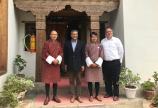
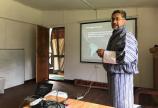
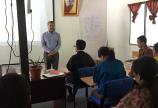
Law, with a Bhutanese twist
Peil, an American law professor who served as a consultant with JSW Law from 2013 before his appointment as vice-dean in 2016, and Dorji are part of a small group of international experts and domestic legal practitioners (the latter trained in India and Australia) convened to guide the delicate process of establishing a formal legal education for the country that is at once both contemporary and “uniquely Bhutanese,” that is, one that reflects a deep tradition of Buddhist philosophy, respects traditional village mediation practices based around the wisdom of local elders and, as with all Bhutanese public institutions, corresponds with the national guiding doctrine of Gross National Happiness. Notably, the architects of JSW’s curriculum have been especially careful to avoid incorporation of the adversarial nature of justice that pervades Western legal systems, a characteristic which can be seen as inconsistent with the values of a country that ranks best in the world on levels of violent crime, perceived criminality, and political terror, according to the 2017 Social Progress Index (Bhutan, nevertheless, remains a “least developed country” and has an economy that is not entirely self-sufficient, relying heavily on subsidization by India.)
Gallery: In a country where 75% of the population identifies as Buddhist, the tradition’s philosophies and rituals are an integral part of the new law school, including, for example, classes in “human dignity.”
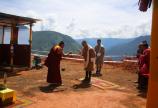
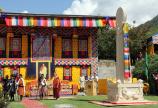
Ramraj sees important lessons to be learned from the Bhutanese example, including the country’s famed focus on Gross National Happiness (GNH) over Gross Domestic Product (GDP) (another initiative of the Fourth King) and best practices around ecological sustainability (the constitution requires that the nation shall maintain at least 60% of its forest cover for perpetuity; it currently stands at 72%). Ramraj also notes parallels between the new UVic joint degree program in Canadian Common Law and Indigenous Legal Orders (JD/JID) launching in fall 2018 and JSW Law’s new program, particularly in their respective emphases on embracing legal pluralism and their focus on conceptions of justice rooted in customary law and relationship to the land.
A history of co-operation
In fact, Canada and Bhutan have had a particularly strong relationship when it comes to educational interchange over the past half-century. Indeed, a Canadian Jesuit priest named William Mackey was responsible for establishing the modern education system in Bhutan, including its first high school (which later became its first accredited university), having been invited into the Kingdom in 1963 as part of the Third King's modernization agenda and to serve as a Royal Tutor. Father Mackey, as he is affectionately known in Bhutan, is now a household name and highly revered national figure; when Mackey passed away in 1995, Dorji, who was about eight years old at the time, remembers school shutting down for the day so that they could go offer prayers for him at a temple. According to Global Affairs Canada, since Mackey’s pioneering work, over fifty Canadians have taught in Bhutanese schools and more than 250 Bhutanese educators have studied at about a dozen Canadian institutions. Such ties may explain why Canada is one of only two G7 countries (the other being Japan) that maintains formal diplomatic relations with Bhutan, a relationship fifteen years old this year.
An ongoing relationship
Back in his graduate stall in UVic’s Diana M. Priestly Law Library, Dorji is busily finishing up the second semester of his doctoral studies with the UVic Law program, conducting research into the Bhutanese constitution and Gross National Happiness, matters close to his heart yet far from his person; ten thousand kilometers away, his students are themselves in the midst of preparing for final exams, marking the end of the very first academic year at JSW Law. In this sense, a visit from Vice-Dean Peil to UVic in late March was likely bittersweet for Dorji, who is eager to return to his faculty role at JSW Law well before graduation of the school’s first cohort in 2022, to get back to the essential business of “producing lawyers zealous of Bhutanese values.”

Meanwhile, this July, Pooja Parmar, assistant professor at UVic Law, will visit JSW Law to engage in collaborative research on property law with her Bhutanese counterparts and assist with the newly formed Bar Council of Bhutan. UVic Law Dean Jeremy Webber and Dorji will be visiting Bhutan this summer to participate in a conference commemorating the 10th anniversary of the country’s constitution. Ramraj is currently planning back-to-back conferences in Victoria and Bhutan for 2019, which will bring together all of his QES-AS project partners, including those also from India, Thailand, Vietnam and Cambodia.
For his part, the Fourth King abdicated the throne in 2006 in favour of his son, relinquishing a role that he had inherited at age sixteen upon the death of his own father. Yet, on the Himalayan foothills overlooking Bhutan's only international airport, construction continues on the future permanent home of JSW Law, an institution that not only bears his name, but also his hopes for the democratic future of his nation.

More info
- Dorji's CAPI profile page
- JSW Law
- Queen Elizabeth II Diamond Jubilee Advance Scholars (QES-AS) program
- CAPI's QES-AS project page: “Regulating globalization in South and Southeast Asia”
- UVic Law
- The NY Times article on JSW Law that served as the catalyst for the UVic-JSW Law connection
Gallery: Bhutan’s first law school: the road to admission
As part of a recruitment drive to promote the new law school, Dorji, Peil, and colleagues travelled to all 58 higher secondary schools in Bhutan between August 2016 and September 2017. You can see more photos and read about their travels on Dorji’s blog:
